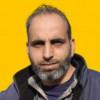Syria after Assad: Why humanitarian aid can’t stop now
I HAVE BEEN working on the front lines of the humanitarian response in Syria for over seven years.
In my current role with GOAL as a Beneficiary Selection Team Leader, I have had the privilege of working closely with internally displaced individuals and families — people who were forced to flee their homes in search of safety within their own country as conflict raged for nearly 14 years.
Over the last couple of months, following the fall of the Assad government and the end of the conflict in Syria, I have also been fortunate to witness the profound joy of people returning home after years of displacement. Everyone is excited about the prospect of a safe homeland, the chance to lead a dignified life, and the opportunity to secure a good future for their children.
Yet, alongside this joy, there is a deep sense of anxiety and uncertainty.
Many families returning to their places of origin have found little more than the remnants of their past — no shelter, food, or basic services like water and power.
As humanitarians working in Northwest Syria, we had long prayed for the days when displaced families could finally return home to the towns and villages they had fled under bombardment. Welcoming them back has been a relief, but our work is far from over.
Munaf works with communities on the ground in Syria. GOAL GOAL
My journey from teaching English to working as a humanitarian in Syria has been both transformative and deeply personal. It began in Idleb, a rural region in northern Syria that has hosted millions of displaced people over the past 14 years.
Idleb is also where my hometown, Kelly, sits – a village that, like many others, was devastated when, in 2011, peaceful protests across Syria were met with oppression and destruction by the now-ousted government of Assad.
In 2012, as the attacks escalated, Kelly was invaded. The forces of the former government conducted raids and set homes ablaze, while our own country’s warplanes bombed us from above.
However, after the initial wave of aggression, the name Kelly soon became synonymous with displacement camps.
For the next few years, as the government’s attacks on Idleb subsided, we watched as tents were erected across the hills surrounding our village every day. Families fleeing from regions like Hama, Aleppo, and Damascus sought refuge in these makeshift camps, often dependent on aid from humanitarian organisations stretched thin as the........























